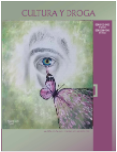Authors
Abstract
Objective. To provide an ethnographical analysis of “friendship” and “trust” relationships within the cannabis movement of the Metropolitan Area of Buenos Aires (AMBA), Argentina. In particular, the role played by these ties in the political praxis of those who recognize themselves as activists. Methodology. Ethnographic fieldwork among cannabis activists of the AMBA, combining techniques such as participant observation, in-depth interview and analysis of secondary sources. Results and conclusions. In the prevailing prohibitionist context, relations of “friendship” and “trust” built on gift-exchange have occupied a central part in the conformation and consolidation of cannabis movement and activism in Argentina. “Friendship” and “trust” not only maintain relationships between activists, but they are also the way in which activists gather their peers’ support, keep up their struggle and express their commitment to it.
References
Belackova, V. and Vaccaro, C.A. (2013). ‘A Friend with Weed is a Friend Indeed’: Understanding the Relationship Between Friendship Identity and Market Relations Among Marijuana Users. Journal of Drug Issues, 43 (3), 289-313.
Bohnert, A.S., Bradshaw, C.P. and Latkin, C.A. (2009). A Social Network Perspective on Heroin and Cocaine Use among Adults: Evidence of Bidirectional Influences. Addiction, 104 (7), 1210-1218.
Bourdieu, P. (2007). El sentido práctico. Buenos Aires, Argentina: Siglo XXI.
Bourgois, P. (2010). En busca de respeto: vendiendo crack en Harlem. Buenos Aires, Argentina: Siglo XXI.
Coomber, R. (2006). Pusher myths: Re-situating the drug dealer. London, England: Free Association Books.
Corbelle, F. (2010). La construcción del consumidor de drogas en el proceso judicial (Tesis de Licenciatura). Universidad de Buenos Aires, Buenos Aires, Argentina.
Corbelle, F. (2016). Dar la cara como ‘usuario responsable’. El activismo político de los usuarios de drogas: de la clandestinidad al Congreso Nacional (Tesis de Doctorado). Universidad de Buenos Aires, Buenos Aires, Argentina.
Curtis, R., Friedman, S., Neaigus, A., Jose, B., Goldstein, M. and Ildefonso, G. (1995). Street-level drug markets: Network structure and HIV risk. Social Networks, 17, 229-249.
Foster, K. and Spencer, D. (2013). ‘It’s just a social thing’: Drug use, friendship and borderwork among marginalized young people. International Journal of Drug Policy, 24, 223-230.
Friedman, S.R., Neaigus, A., Jose, B., Curtis, R., Ildefonso, G., Goldstein, M., and Des Jarlais, D.C. (1999). Networks, norms, and solidaristic/altruistic action against AIDS among the demonized. Sociological Focus, 32, 127-142.
Godelier, M. (1998). El legado de Mauss. En El enigma del don (pp. 23-156). Barcelona, España: Paidós.
Goode, E. (1970). Marijuana smokers. New York, United States: Basic Books.
Grillo Christoph, C. (2008). O ‘morro’ e a ‘pista’: Um estudo comparado de dinâmicas do comércio ilegal de drogas. Dilemas, 1, 127-148.
Grund, J.C., Friedman, S.R., Synn Stern, L., Jose, B., Neaigus, A., Curtis, R. and Des Jarlais, D.C. (1996). Syringe-mediated drug sharing among injecting drug users: patterns, social context and implications for transmission of blood-borne pathogens. Social Science and Medicine, 42(5), 691-703.
Langer, J. (1977). Drug entrepreneurs and dealing culture. Social Problems, 24, 377-386.
Martin, F.S. (2010). Becoming vulnerable: Young women’s accounts of initiation to injecting drug use. Addiction Research and Theory, 18 (5), 511–527.
Mauss, M. (1979). Ensayo sobre los dones. Motivo y forma del cambio en las sociedades primitivas. En Sociología y Antropología (pp. 155-263). Madrid, España: Tecnos.
Neaigus, A., Friedman, S.R., Curtis, R., Des Jarlais, D.C., Furst, R.T., Jose, B., Mota, P., Stepherson, B., Sufian, M., Ward, T. and Wright, J. W. (1994). The relevance of drug injectors’ social and risk networks for understanding and preventing HIV infection. Social Science and Medicine, 38 (1), 67-78.
Pilkington, H. (2007). Beyond ‘peer pressure’: Rethinking drug use and ‘youth culture’. International Journal of Drug Policy, 18 (3), 213-224.
Pita, M.V. (2010). Formas de morir y formas de vivir. El activismo contra la violencia policial. Buenos Aires, Argentina: Del Puerto/ Centro de Estudios Legales y Sociales.
Pitt-Rivers, J. (1992). El lugar de la gracia en antropología. En J. Pitt-Rivers y J.G. Peristiany (Ed.). Honor y gracia (pp. 280-322). Madrid, España: Alianza.
Sahlins, M. (1983). La economía de la Edad de Piedra. Madrid, España: Akal.
Sigaud, L. (1996). Direito e coerção moral no mundo dos engenhos. Estudos históricos, 9(18), 361-388.
Taylor, M. and Potter, G.R. (2013). From ‘Social Supply’ to ‘Real Dealing’: Drift, Friendship, and Trust in Drug-Dealing Careers. Journal of Drug Issues, 43 (4), pp. 392-406.
Van Hemp, H. (2010). El bueno, el malo y el feo. Revista THC, 30, 42-45.
Van Hemp, H. (2011). Quién te quita lo fumado. Revista THC, 42, 32-39.
Willis, P. (1990). Common culture: symbolic work at play in the everyday cultures of the young. San Francisco, United States: Westview Press.
Wolf, E.R. (1980). Relaciones de parentesco, de amistad y de patronazgo en las sociedades complejas. En M. Banton (Comp.). Antropología social de las sociedades complejas (pp. 19-39). Madrid, España: Alianza.
Zimmerman, D.H. y Wieder, L.D. (1977). You can’t help but get stoned: Notes on the social organization of marijuana smoking. Social Problems, 25, 198-207.

 PDF (Español)
PDF (Español)
 FLIP
FLIP






















